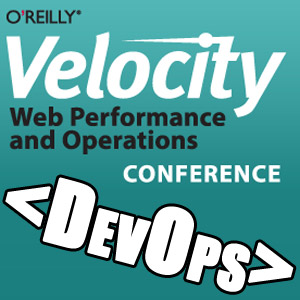 NEWS
NEWS
 NEWS
NEWS
 NEWS
NEWS
![]() Hosted by O’Reilly Media at the Santa Clara Convention Center, Velocity 2013 was the single, most important must-attend conference for web operations and development professionals. The home of data science, the conference brings together practitioners, researchers, IT leaders and entrepreneurs to discuss DevOps, big data, Hadoop, analytics, visualization and data markets.
Hosted by O’Reilly Media at the Santa Clara Convention Center, Velocity 2013 was the single, most important must-attend conference for web operations and development professionals. The home of data science, the conference brings together practitioners, researchers, IT leaders and entrepreneurs to discuss DevOps, big data, Hadoop, analytics, visualization and data markets.
From startups to the Fortune 500, smart companies are betting on insight data-driven technologies. The focus for this year event was on scaling and administering web applications, mobile applications, and tech culture.
Web Performance – Fast-growing DevOps movement
TheCUBE discussion series with various participants at Velocity focused on culture as well as fast-growing DevOps movement and the challenges of DevOps.
Colt McAnlis, Game Developer Advocate at Google, discussed mobile and web performance from a developer perspective. He promotes the opinion that the Web has created an environment where internal engineers are pushing the web forward and where external developers also push the web forward–so the problem becomes finding the place where the “medium value” is when deciding on who to back in this race (or at least how to support both internal and external.) The landscape when it comes to mobile, however, sees an ever-changing technological space that is still figuring itself out–and its sheer popularity is pushing out even more developments than ever before.
Ilya Grigorik, Developer Advocate for High Performance at Google, talked on performance with a view that web performance if key to make the web succeed. Traffic from mobile devices is going up and it has surpassed desktop traffic. Mobile web is so attractive that developers have started delivering products that satisfy the customers’ needs. Grigorik said we’re going to see a collection of technologies in the future focusing on the server-side and Google Compute Engine can provide the necessary infrastructure for it.
Another participant talked about performance was Vik Chaudhary, Executive VP at Keynote Systems. He said the mobile performance itself depends on a variety of factors, from the main device, the network, etc. One has to be able to understand performance and how it’s travelling across the entire ecosystem, from the end-user to the infrastructure applications.
Chaudhary said the expectations are high on usability and how fast things should be in the consumer world, whereas IT infrastructure think businesses and IT can be run in the cloud. The cloud simplifies things for developers by giving them access to world-class resources, but on the other hand, it raises questions regarding the security and the network issues.
Nicholas Zakas, Staff Software Engineer at Box, shared that the current web standard for app and monitoring starts with analytics. JavaScript along with CSS, HTML, browser, and server tools are the key for developers to create a nice balanced web app.
Mobile, Big Data and Analytics – Areas of implementation of DevOps
DevOps in turn focuses primarily on how to create a fast and steady stream of work for the development and administration. Continuous integration and releases are the result of the work of developers, which in turn is the material for admins.
Doug Sillars, Principal Architect-App Optimization at AT&T, revealed that last year AT&T spent 20 billion dollars on infrastructure. AT&T came up with a tool that’s called the Application Resource Optimizer (ARO), which is free and its open source. The tool can tell mobile developers whether or not their apps are caching the images, or killing the users’ batteries and abusing their data plans and help them to make their apps run better. More than that, better apps will make the network faster.
A lot of the conversations at theCUBE were about open source, big data and analytics. DevOps practices correlate most with measurable performance improvement and forms the basis for best practices that deliver results.
Theo Schlossnage, CEO at OmniTI, discussed DevOps trends and new technology adoption in the enterprise. Asked if some stability has been reached in DevOps, Schlossnage stated the industry is coming to grips for more generalized talent, DevOps is not just a term that you here at conference. When it comes to new technology adoption, he said Big Data solutions can improve business processes and increase efficiency.
Nicole Sullivan, Founder of Liquid Elephant, discussed user interface (UI) trends and explained that it’s a big difference in the performance aspect. In UI development, there are things companies are doing really well and other that don’t work at all. Data and analytics are key to improve UI by measuring things.
Olivier Pomel, CEO of DataDog, said that the main problem is making sure everyone has the same understanding of the data. Metrics, Analytics, and Big Data are the hottest things and monitoring is one of the hot trends here, and it’s not just monitoring the lifecycle of coding, but monitoring the system performance as well.
The DevOps movement, backed by a passionate following, certainly must be focused on culture as well as code. There are lots of operations folk talking about automation and this philosophy and paradigm will only see swifter adoption as it continues to show real business value.
Support our mission to keep content open and free by engaging with theCUBE community. Join theCUBE’s Alumni Trust Network, where technology leaders connect, share intelligence and create opportunities.
Founded by tech visionaries John Furrier and Dave Vellante, SiliconANGLE Media has built a dynamic ecosystem of industry-leading digital media brands that reach 15+ million elite tech professionals. Our new proprietary theCUBE AI Video Cloud is breaking ground in audience interaction, leveraging theCUBEai.com neural network to help technology companies make data-driven decisions and stay at the forefront of industry conversations.